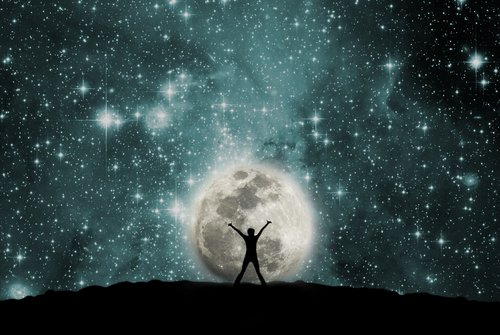In answering this question, members of the clergy usually vote for God. Scientists — who prefer explanations subject to laboratory tests — figure that everything we see today was as inevitable as wrinkles, once the Big Bang established physics. Stars and planets were cooked up as huge clouds of matter collapsed and coalesced. Life — amazing as it seems — was just an epiphenomenon, a sticky bit of chemistry that tufted the occasional cosmic niche. The universe wasn’t constructed for our benefit in this scenario: We’re just here for the grins.
The split between religion and science is relatively new. Isaac Newton, who first worked out the laws by which gravity held the planets and even the stars in their traces, was sufficiently impressed by the scale and regularity of the universe to ascribe it all to God.
Physicist Stephen Hawking, who has authored a new book on cosmology (The Grand Design), now says that Newton underestimated his own discoveries. The law of gravity is like “love” to the Beatles: it’s all you need. With gravity in place, the cosmos-as-we-know-it was just a matter of hanging out for a few billion years.
However, this approach inevitably begs the question, “who designed gravity?” Isn’t it remarkable that this gentle force seems so perfectly suited to the job of assembling a grand and habitable universe?
And indeed, even leaving gravity aside, there are many other physical parameters that seem to be nicely adjusted for our presence. This is frequently referred to as a “fine tuning” of the cosmos. If, for instance, the charge on the electron were of a slightly different value, stars wouldn’t work adequately, and you would be spared both this blog and your existence.
Depending on your personal philosophies, you can either credit this custom fitting to the intentions of God, or go for Plan B. The latter posits a multiverse — a gazillion other universes, each with their own physics, their own law of gravity, electron charge, etc. Most are unproductive and uninteresting (at least from our anthropocentric viewpoint). But by chance, some are OK. Our cosmos is one of the winners in this parallel-universe lottery. The multiverse idea avoids the necessity of requiring someone or something with good intentions to generate our existence. If we’re here, asking where we came from, chalk it up to being a lottery winner.
So is there some way to choose between these two cosmological views?
Well, it’s worth noting that invoking God as the entity who set our universe in motion isn’t contradicted by the data. Of course, scientists would say the supreme being hypothesis is faith, and outside the realm of science — that it’s not amenable to experiment. But we currently have the same problem with the notion of parallel universes. No confirmatory data there, either. That may be why so many theoreticians are poking at the multiverse suggestion, in hopes of working out some experimental test that would prove that those other, mostly worthless, universes really exist, floating in ghostly hyperspace.
Nonetheless, it sounds as if an answer to the question of our origin admits of only two decent possibilities: God did it, or the multiverse did it. Well, fortunately for you, cosmology has acknowledged the whims of a consumer society, and offers additional choices. For example, perhaps future physicists will learn that there’s only one way Nature’s laws can be structured; our way. That seems strange in principle, and likely to raise more questions than it answers, but it’s possible.
Another tack has been taken by physicist and science writer John Gribbin. He recently opined that building a universe — even a nicely tuned one — is not a particularly difficult technical challenge. Heck, our foreseeable descendants might be able to do it.
So Gribbin is suggesting that our cosmic existence might have been set in motion by mere mortals. Not humans, mind you, but beings in some other universe: advanced extraterrestrials, or perhaps one should say, extrauniversals. Note that it doesn’t cost much to build a universe: the total mass-energy in the cosmos is zero, which is to say that the required expenditure on raw materials is also zero. It’s a wistful idea: We’re merely the science fair project of a kid in another universe.
If that doesn’t buoy your boat, there’s this: Oxford University philosopher Nick Bostrom has suggested that reality — you, your pals, and everything you see and do — might be merely a massive computer simulation being run by, for example, a 25th century historian interested in researching life in the 21st century. In other words, your life is just a bunch of zeroes and ones. (Bostrom pegs the probability of our being avatars in a digital universe at 20 percent, but admits that the estimate is subjective.) Mind you, one has to ask whether the world of whoever is running this “ancestor simulation,” as Bostrom calls it, is in a real universe, or merely another avatar in a simulation run by some even more advanced being. This begins to sound like turtles all the way up.
Bottom line? The answer to the question of where we came from is that we don’t know the answer. But the discussion continues. Biologist Stephen Jay Gould used to try and separate some of the antagonists in this occasionally acrimonious debate by declaring that religion and science were separate magisteria. That’s a lovely idea, but frankly there’s an awful lot of skirmishing on the border.
